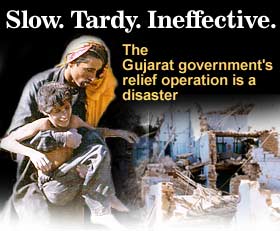The Rediff Special/ Ramesh Menon

Numerous foreign relief teams, who came hoping to use technology and their expertise to rescue the trapped and tend to the injured, were left high and dry after reaching Ahmedabad. No one told them about the plan of action, dispatched them to the affected areas and ensured they had local guides and transport, says Roving Editor Ramesh Menon.
A Japanese medial team that arrived in Ahmedabad was told to go to Gandhinagar. Why? No one knows.
There are no victims to tend to in Gandhinagar. Thousands of the injured are lying in various
villages in Kutch without proper medical care. The team's dilemma did not end there. At
Gandhinagar they were ignored, as no one knew what to do with them.
It is ironical that so many victims continue to suffer because of the Gujarat government's lack of coordination and planning. All this is happening when countries like Israel are flying in mobile hospitals, operation theatres and life saving drugs.
Lauritzen Holvar, the Norwegian director of the International Red Cross Society, told a newspaper reporter that he had come to Bhuj to launch a huge relief operation, but did not know what to do. No one briefed him. No one thought it important to provide him any instructions for a rescue and relief operation. The Red Cross wanted to fly in planes every hour with relief.
Other foreign rescue workers spent more than 24 hours in Bhuj without anyone telling them what to do and where to go. This, when thousands of people lay trapped under the debris.
All this is happening in spite of the many control rooms and huge army of bureaucrats to co-ordinate the relief and rescue operation. Sure, there are communication problems, but that is hardly an excuse.
The relief and rescue operation has also been hampered because of traffic jams on the way to Bhuj. As heavy engineering equipment to clear the debris was to travel to the Kutch town, the police should have been deployed to clear the traffic. For many hours, dumpers, scoopers and other equipment were stranded on the highway.
Thousands of lives may have been saved had Keshubhai Patel's Bharatiya Janata Party government reacted swiftly and sharply.
Nothing can illustrate the government's tardiness than the fact that Chief Minister Patel and Governor Sunder Singh Bhandari sat through the Republic Day ceremony which went on till 11.50 am, almost three hours after the quake.
The government could have made optimum use of various foreign rescue teams. Bucher Edi,
leader of the Swiss disaster rescue dog team, refuses to discuss it, saying this was the time to act swiftly, not criticise. "We must all sit down and find solutions, not problems," he said.
Prime Minister Atal Bihari Vajpayee admitted the relief and rescue work was slow.
Home Minister L K Advani was booed when he tried to visit the affected areas.
Industries Commissioner K N Shelat, who is in charge of looking after international assistance, told rediff.com that the task on hand is huge and there are bound to be problems.
But how does one explain this?
An Israeli team bringing with it mobile hospitals and operation theatres was asked to land in
Ahmedabad. Only after wasting precious hours were the Israelis allowed to fly to Bhuj. No one can
answer why there was a delay in communication.
Actually, few government officials knew what to do. The Rapid Action Force, trained to handle riots
and disturbances, did not know how to tackle tonnes of concrete rubble. RAF troops had no equipment and were hesitant in getting into crashed buildings.
This is what happened at Tagore Park Society in Ahmedabad. A four-storey building had crashed, the RAF arrived, stood there for two hours and left. Residents of the nearby Juhapura slum removed the rubble and saved eight lives.
Local relief teams have no experience to fall back on. Gujarat has never seen a disaster of such magnitude. The absence of a disaster management plan only makes it worse.
 Adding to the problem were numerous VIP visits. The prime minister's tour, for instance,
threw the administration out of gear. That he wanted to move around in Kutch sent government officials into a panic. They ran around collecting information, fearing he might ask for it. They also had to ensure that his security needs were met. It halted rescue and relief work for many vital hours.
Adding to the problem were numerous VIP visits. The prime minister's tour, for instance,
threw the administration out of gear. That he wanted to move around in Kutch sent government officials into a panic. They ran around collecting information, fearing he might ask for it. They also had to ensure that his security needs were met. It halted rescue and relief work for many vital hours.
Vajpayee visited the area for three hours, but officials ran helter skelter the whole day when they could have concentrated on saving lives. Chief Minister Patel agreed that VVIP visits were a strain on the administration.
"Everyone wants to be seen in Bhuj. It is a great photo opportunity for politicians as hundreds of journalists are around and television cameras are whirring away," says Dinesh Patel, a Ahmedabad businessman, with a tinge of sarcasm in his voice.
In the eighties, Vasant Vani, a former municipal corporator and Red Cross president, had drawn
up an elaborate disaster management plan. Ironically, he had done so at the state
government's behest. Every district was reportedly sent a copy of the plan, but it was never implemented.
Today, the irony of shortsightedness has hit Gujarat in its face.
Design: Dominic Xavier
The Complete Coverage | List of earthquake sites
Back to top